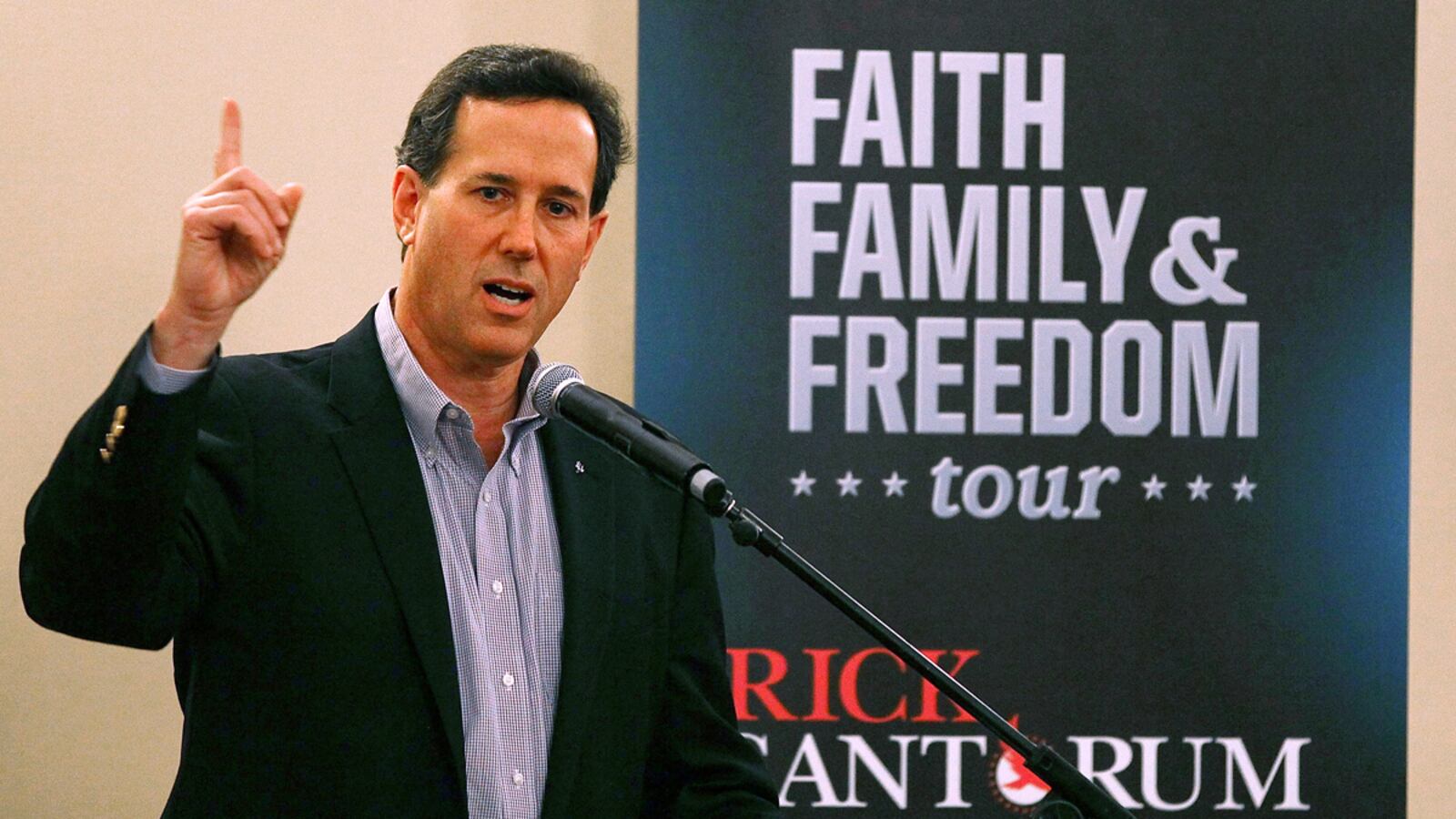On Sunday morning, Rick Perry was talking about death-defying stunts at a Myrtle Beach, S.C., prayer breakfast sponsored by Ralph Reed’s Faith and Freedom Coalition. His strange, wan speech argued that a leader is someone whom you’d trust to push you across a tightrope over Niagara Falls in a wheelbarrow. “Friends, that’s what leadership is really all about—who are you going to trust to take you across the Falls,” he said, as the elderly crowd looked at him in confusion.

Then the next speaker, the writer Eric Mextasas, took the podium—and quickly suggested that Perry should drop out. A Santorum supporter, he said he hoped that “some of these wonderful men who are running will hear from God and get out of the race before Saturday for the good of this nation,” a line that was met with scattered applause. Happily, Perry had left by then, so we didn’t have to see his face when the words sank in. With him gone, the only candidate in the audience was Santorum, who was waiting to give the event’s culminating address.
As it happens, Mextasas wasn’t talking about Perry alone. “I was thinking specifically of the two men I admire most besides Rick Santorum, and that would be Speaker Gingrich and Governor Perry,” he told me after the breakfast. Like many Christian conservatives, he fears that “if we all do not get behind one candidate now, we may regret it for the rest of our lives.”
Right now, there’s a somewhat frantic effort among some on the Christian right to corral their movement behind Santorum, who has already proved to be the favorite of evangelicals in Iowa. Many religious right figures are still haunted by their failure in 2008 to rally to Mike Huckabee, which they feel enabled the victory of John McCain, whom they distrusted even more than they do Mitt Romney.
The author of biographies of Dietrich Bonhoeffer and William Wilberforce, Mextasas spoke of moments in Nazi Germany when people missed the opportunity to do the right thing and head off calamity. “I don’t want to draw the parallel too starkly to Germany, because it gets ridiculous,” he said. “But I think many people are aware of what’s at stake in this election. I think America is at stake. And there’s a moment now in South Carolina, before Saturday, when people need to hear that. They need to know that God is calling them to make a decision.”
On Saturday, more than 150 leading religious conservatives gathered in Brenham, Texas, to see if they could agree, this time, to coalesce behind a single candidate. Perry was eliminated on the first ballot. By the third, when some attendees had already left, Santorum won the group’s imprimatur with 85 votes, compared to 29 for Gingrich. In a conference call about the results, Tony Perkins, head of The Family Research Council, said we could expect fundraising drives and other sorts of activism on Santorum’s behalf from the group’s participants.
Gloria Hein, one of my prayer breakfast tablemates, said the Texas group’s Santorum endorsement made her more likely to vote for him. “I’ve been rooting for Santorum, but I thought he didn’t stand a chance,” she said. “I think that’s a great encouragement that they’re behind him. I’m getting chills right now!”
Whatever momentum Santorum can generate from the endorsement will likely build on itself, because his biggest challenge is convincing people who want him to win that he actually can. “The question is will the people of South Carolina vote their conscience,” he said at the prayer breakfast, or will they let outsiders who don’t “speak our language,” the language of faith, “tell them, tell you, who has the best chance of winning.”
Reed, though, who wasn’t at the Texas meeting, seemed unconvinced. He gave Santorum a fulsome introduction that sounded almost like an endorsement, calling him “the most effective conservative and pro-family legislator of his generation.” Talking to him after the event, though, Reed suggested that none of candidates besides Romney have yet proven themselves viable. “To win this nomination you have to have three things,” he said. “No. 1, you need to raise $50 to $100 million. No. 2, you have to build a strong field organization in the first 10 or 20 primary states, and No. 3, you have to lay out a very compelling message to the voters as to why you’re uniquely qualified to be the next president.” At this point, he acknowledged, “there’s only one candidate who has been able to do all those three things.” This is still, after all, politics. Faith only takes you so far.






